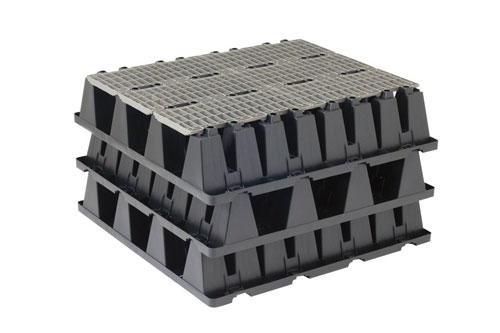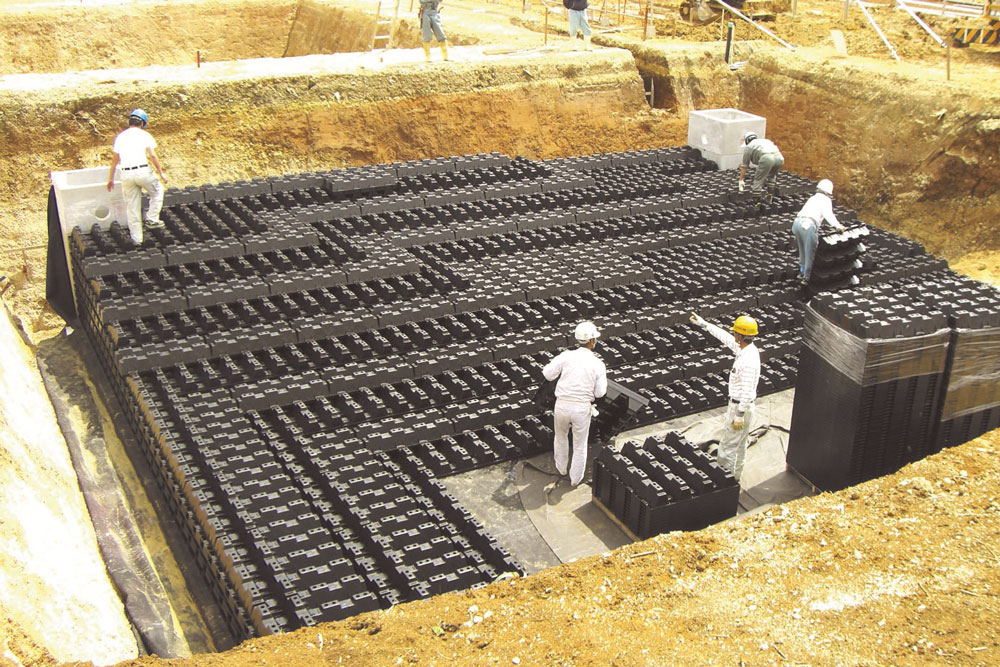Rainwater Storage System to Reduce Damage from Floods and Resolve Water Shortages
SEKISUI CHEMICAL CO., LTD.
| Publication date | February 16, 2018(Posted on July 07, 2022) |
|---|---|
| Sector | Natural Disasters / Coastal Areas, Water Environment / Water Resources |
The water shortages caused by droughts brought about by climate change exacerbate the damage to agricultural production, and an increase in extreme weather cause flooding. SEKISUI TECHNO MOLDING CO., LTD., a subsidiary of SEKISUI CHEMICAL CO., LTD., developed a rainwater storage system, CROSS-WAVE which stores rainwater in a water storage tank to provide stable supply of water in times of low rainfall and to prevent flooding in times of heavy rainfall.
Company Overview

SEKISUI CHEMICAL CO., LTD. was founded in 1947 as a major resin manufacturer. The company is expanding its business by handling a wide range of products, from daily necessities such as cellophane tape and polyethylene buckets to plumbing equipment and materials that support public and private infrastructure, high-performance materials for electronics and transportation equipment, medical supplies, and the innovative SEKISUI HEIM unit housing. The Group's vision is to contribute to improving the lives of the people around the world and the Earth’s environment, by continuing to open up new frontiers in residential and social infrastructure creation and chemical solutions through prominence in technology and quality. The Group is also promoting environmental contributions as the core of its business activities based on SEKISUI Environmental Sustainable Vision.
Adaptation Initiatives
[Products and Technologies]
- CROSS-WAVE:
- A rainwater harvesting system that controls the amount of rainwater flowing into sewage and rivers during heavy rainfall, enabling the rainwater to be reused. Rain water is stored in underground water storage tanks, and plastic storage materials are used to reuse or control runoff.
Compared with concrete storage tanks, it has the following advantages.
- Short-term, low-cost installation
- Contributes to the reduction of CO2 emissions in the product life cycle by using recycled plastic
- The heavy load capacity design allows the ground to be used as a parking lot after installation. Also effective in preventing ground subsidence.
- The high void ratio creates space for water underground, contributing to the effective use of rainwater and control of runoff. As a countermeasure against heavy torrential rain, rainwater that falls on the site is temporarily stored and gradually drained away to prevent flooding. The stored rainwater can be used for sprinklers in parks or flushing toilets.
[Project Details]
In India, it is mandatory to install rain water storage facilities when constructing factories due to chronic water shortages. In that context we started our sales overseas in 2010, and by 2017, we had more than 8000 installation cases within and outside of Japan. Generally, many water tanks are built on factory sites, but CROSS-WAVE can be installed underground, such as under parking lots, which matches the needs of many our clients. We also have our installation experience in China, where the "sponge city policy" promotes urban greening and disaster prevention by absorbing rainwater into the ground for recycling, and in Taiwan, where typhoons cause serious flood damage. We are also working to expand our business in Vietnam.
In each country, the Group’s local subsidiaries cooperate with local consulting companies to promote projects and sell products through distributors. In India, the products are locally manufactured, and in other countries, they are exported from Japan.
[Factors of Success and Challenges for Further Development]
In India and China, we were able to realize the project by cooperating closely with local governments from the stage of establishing standards. We collaborated with consulting companies that are familiar with the local situations to build up relationships with the local governments. The strength of the product and the ease of construction and maintenance are also considered to be factors of its success in each country.
In order to further expand our achievements, our future challenges are to expand local production and to develop standards and performance evaluation methods to ensure the installation of high quality products.



